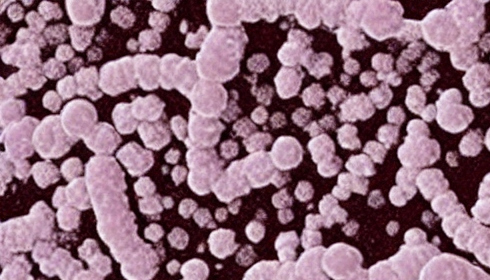Severity: Warning
Message: fopen(/var/cpanel/php/sessions/ea-php74/ci_sessionbd521da28d2ec15826dbbf72df84358d4a890c14): failed to open stream: No space left on device
Filename: drivers/Session_files_driver.php
Line Number: 176
Backtrace:
File: /home/drugtodayonline/public_html/application/controllers/Medical_news.php
Line: 9
Function: __construct
File: /home/drugtodayonline/public_html/index.php
Line: 311
Function: require_once
Severity: Warning
Message: session_start(): Failed to read session data: user (path: /var/cpanel/php/sessions/ea-php74)
Filename: Session/Session.php
Line Number: 143
Backtrace:
File: /home/drugtodayonline/public_html/application/controllers/Medical_news.php
Line: 9
Function: __construct
File: /home/drugtodayonline/public_html/index.php
Line: 311
Function: require_once

Gut Bacteria Study Offers Hope: Reduced Infection Risk Linked to Butyrate-Producing Bacteria
A groundbreaking study set to be presented at the European Congress of Clinical Microbiology and Infectious Diseases (ECCMID 2024) in Barcelona, Spain, brings promising news in the fight against infections. Led by Robert Kullberg from Amsterdam University Medical Centre, Netherlands, and his team, the study sheds light on the role of gut bacteria in infection risk.
The study, which was conducted on two large European patient cohorts, shows a significant correlation between gut bacteria and the likelihood of hospitalisation due to infections. In particular, the risk of hospitalisation due to infection decreases by 14 to 25 when the number of butyrate-producing bacteria in the gut increases by 10%.
Microbiota alterations, commonly observed in patients with severe infections, prompted the investigation into the protective effects of anaerobic butyrate-producing gut bacteria. These bacteria, often depleted in individuals hospitalised for severe infections, play a crucial role in safeguarding against systemic infections. Moreover, butyrate may offer protective benefits for various intestinal diseases beyond infections.
Despite previous findings, the direct relationship between microbiota disruptions and susceptibility to severe infections in humans remained unclear. To address this gap, the researchers analysed baseline gut microbiota and the risk of infection-related hospitalisation in two large population-based cohorts, from the Netherlands (HELIUS) and Finland (FINRISK 2002).
The team used advanced sequencing techniques to analyze the gut microbiota in faecal samples. They identified different types of bacteria and tracked the composition, diversity, and relative abundance of butyrate-producing bacteria. The study monitored hospitalization or mortality rates due to infectious diseases over a follow-up period of 5 to 7 years, based on national registry data. Statistical models were used to examine associations while adjusting for various factors such as demographics, lifestyle, and comorbidities.
The results were compelling. Out of 10,699 participants, 602 were hospitalized or deceased due to infections during the follow-up period. Participants with higher levels of butyrate-producing bacteria exhibited a significantly lower risk of infection-related hospitalisation—a 25% reduction in the Dutch cohort and a 14% decrease in the Finnish cohort.
The authors emphasise the significance of these findings, highlighting the potential for microbiome modulation to mitigate infection risks in the general population. However, they caution that further research is necessary before clinical trials can commence. One of the challenges faced is the transport of viable bacteria into the gut, particularly due to the strict anaerobic nature of butyrate-producing bacteria.
Severity: Warning
Message: mysqli::query(): (HY000/1): Can't create/write to file '/tmp/#sql_3e5_0.MYI' (Errcode: 28 - No space left on device)
Filename: mysqli/mysqli_driver.php
Line Number: 307
Backtrace:
File: /home/drugtodayonline/public_html/application/models/Site_ads_model.php
Line: 118
Function: query
File: /home/drugtodayonline/public_html/application/libraries/Common_lib.php
Line: 318
Function: get_front_ads_data
File: /home/drugtodayonline/public_html/application/views/front/news_topic.php
Line: 332
Function: common_footer_ads
File: /home/drugtodayonline/public_html/application/controllers/Medical_news.php
Line: 361
Function: view
File: /home/drugtodayonline/public_html/application/controllers/Medical_news.php
Line: 28
Function: news_topic
File: /home/drugtodayonline/public_html/index.php
Line: 311
Function: require_once
Severity: Warning
Message: Cannot modify header information - headers already sent by (output started at /home/drugtodayonline/public_html/system/core/Exceptions.php:271)
Filename: core/Common.php
Line Number: 570
Backtrace:
File: /home/drugtodayonline/public_html/application/models/Site_ads_model.php
Line: 118
Function: query
File: /home/drugtodayonline/public_html/application/libraries/Common_lib.php
Line: 318
Function: get_front_ads_data
File: /home/drugtodayonline/public_html/application/views/front/news_topic.php
Line: 332
Function: common_footer_ads
File: /home/drugtodayonline/public_html/application/controllers/Medical_news.php
Line: 361
Function: view
File: /home/drugtodayonline/public_html/application/controllers/Medical_news.php
Line: 28
Function: news_topic
File: /home/drugtodayonline/public_html/index.php
Line: 311
Function: require_once
Error Number: 1
Can't create/write to file '/tmp/#sql_3e5_0.MYI' (Errcode: 28 - No space left on device)
SELECT * FROM `dt_site_ads` WHERE `status` = '1' and `loc` = 'pre_footer_4' ORDER BY RAND() LIMIT 0,1
Filename: models/Site_ads_model.php
Line Number: 118